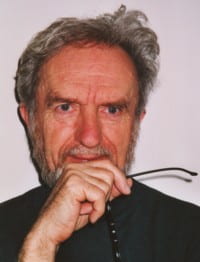b. 21 January 1937, Łomża
Biography
Zbigniew Bargielski studied law at the Maria Curie-Skłodowska University in Lublin (1954-57). In 1958 he began studying composition at the State College of Music in Warsaw under Tadeusz Szeligowski. After his teacher’s death he continued his studies under Bolesław Szabelski at the State College of Music in Katowice, where he gearned a degree in composition in 1964. He continueded his studies under Nadia Boulanger in Paris (1966-67) on a French government scholarship, and also at the Hochschule für Music in Graz (1972). Since 1976 he has been living in Austria, where he is engaged in teaching.
Bargielski’s compositions have been played at numerous festivals of contemporary music, such as the Warsaw Autumn, Muzicki Biennale Zagreb, Festival de Paris and Steirischer Herbst in Graz. He has received prizes at composers’ competitions, among them the First Prize at the Young Polish Composers’ Competition for his Parades for orchestra (Warsaw, 1965) and the Second Prize at the Arthur Malawski Composers’ Competition (Cracow, 1976), as well as Special Mention at the UNESCO International Composers’ Rostrum (Paris, 1981) for the Alpine String Quartet.
In his compositions Bargielski applies his own method of the organization of sound material. It is based on balancing the proportions of quantity, dynamics and instrumentation that occur between center sounds (specially isolated) or constant harmonic centers (sets of sounds) and the remaining sounds of the twelve-tone scale (neutral or “neutralizing” sounds). The composer refers to the system based on this method as “the theory of center structures.” For the first time he put this theory into practice in his Rose Garden (1971); subsequently he used it in most of his works (such as Concerto for Percussion, Violin Concerto and String Quartets Nos.1 and 2, among others).
List of Works
Chamber Music
Neosonatina for violin and piano — 1956
Alpine String Quartet — 1976
Butterfly Cage, wind quintet — 1978
String Quartet “Spring” — 1980
Orchestral Works
Parades 1970 for symphony orchestra — 1970
Concerto for percussion and orchestra — 1975
Concerto for violin and orchestra — 1975
Polish Rhapsody for wind orchestra and percussion — 1976
“…and they will both flame up, and no one will suppress it,” for string orchestra — 1978
Reconstruction of a picture for orchestra — 1980
Nocturne in blue for violin and string orchestra — 1981
Music for Solo Instruments
Seven Studies for piano — 1957
Five Sonnets for violin (or viola) solo — 1962
Impromptu for percussion solo — 1975
Quasi una Fantasia for bassoon solo — 1979
The Glance of the Cyclops for tuba solo — 1980
Vocal-Instrumental Works
Im Kreis for soprano, alto, baritone, bass and chamber ensemble, to the text by Alicja Patey-Grabowska — 1969
Rose Garden for baritone and bass clarinet, to the text by Thomas S. Eliot — 1971
Ein Zimmer for clarinet, trombone, cello, piano and reciter (tape), to the text by Franz Kafka — 1972
4 Love Songs for mezzo-soprano and piano, to words of Alicja Patey-Grabowska — 1972
There’s yet night, there’s yet sound for mezzo-soprano, 4 percussionists and orchestra; abstract text — 1980
Works for Instrumental Ensembles
Servert for 1-3 string instruments (violin or viola or violoncello), percussion and piano — 1966
Still Life With a Rose for brass instruments and percussion — 1977
Glasvogel for 4 recorders and harpsichord — 1977
Valley of Dry Bones for instrumental ensemble and 6 percussionists — 1977
Soiree D’antan for guitar and harpsichord/celesta (1 performer) — 1980
Traumvogel for accordion and percusssion — 1980
Wooden Wings for 6 percussionists — 1980
Stage Works
The Little Prince chamber opera — 1966
Danton or some Scenes from the History of the Great French Revolution — 1968-1969
Ghosts do not Lie tragicomic opera — 1972
Alice in Wonderland opera for the young — 1971-2
The Little Haunted Manor comic opera — 1979-80
Manuscripts at USC
See the PMC Manuscript Collection
Page updated on 21 February 2018
